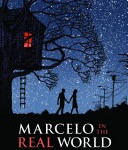 Dear Writer and Reader, this is for you. I offer this post as a gift. Listening to Francisco Stork is just such a gift.
Dear Writer and Reader, this is for you. I offer this post as a gift. Listening to Francisco Stork is just such a gift.
Francisco X. Stork – Remembering Who You Are
Francisco Stork speaks humbly about his writer’s journey in the creation of a novel. “I’m always disappointed in a way [with a draft]. The written word doesn’t quite measure up to what I envisioned.” One of his supports when he  is in that place of profound disappointment, he says, is to remember “kindness to myself,” a kindness that eases his spirit. It also deepens his writing. In his novel Irises he created two girls, Mary and Martha, drawn from the biblical characters by those names. “I liked Mary. She was an artist. But I didn’t love Martha. I think I gave her all the qualities in myself I didn’t like.” He shifted to becoming curious about her, seeing her many dimensions, softening to her, appreciating her as, in kindness, he could appreciate himself, and the character became flesh on the
is in that place of profound disappointment, he says, is to remember “kindness to myself,” a kindness that eases his spirit. It also deepens his writing. In his novel Irises he created two girls, Mary and Martha, drawn from the biblical characters by those names. “I liked Mary. She was an artist. But I didn’t love Martha. I think I gave her all the qualities in myself I didn’t like.” He shifted to becoming curious about her, seeing her many dimensions, softening to her, appreciating her as, in kindness, he could appreciate himself, and the character became flesh on the  page.
page.
He says, “Love makes a difference in how rich a character becomes on the page.” Through being patient with himself as a writer, he suggested, he honors the complexity and genuineness of Marcelo (Marcelo in the Real World), Pancho (The Last Summer of the Death Warriors) and Maria and Kate (formerly Martha, in Irises).
One way to describe Stork’s books is to say he writes about love. Kate, in Irises, tries to figure out: is what she feels for the boy who has asked her to marry him love? She wonders, could love be more than this? The Last Summer of the Death Warriors turns on the power of love two boys feel for a girl.
Stork speaks about “writing from that inner poverty” of not being sure of what he has to offer, all he can do is to “speak from his own personhood.” I believe he means that in order to create characters with this core belief in integrating a self, a writer must be on a life-long journey to know and have patience with himself.
Something else stands out about his books: his characters are mostly Latino but he does not write about the subject of Latinos. He said, “I try to write about things that could happen to anybody. Marcelo has Asperger’s syndrome. Somebody said to me, ‘I didn’t even know he was Latino.'” The same could be said about Marcelo’s Aspergers. Asperger’s syndrome in some ways becomes backstory to a universal story of a young man searching for authenticity. Stork, who is Mexican-American, savors stepping away from a Latino focus. He says, “I’d prefer that readers take a look at the quality of the work and not focus on the book of a Latino writer.” He says, sure, he’d like to change the stereotype of Latino, but he’d like to reach readers “in a subtle way. I want to change stereotypical thinking by a good story.”
I read Marcelo in the Real World after we talked. Marcelo brought home the journey of writer and character that Stork spoke about. Perhaps in Francisco Stork’s ethical world, he gives his characters a catalyst to travel with on the journey he offers – the journey to “remember who you are.”
In a beautifully played-out closing scene, Stork repeats the reward Marcelo wins after he commits a courageous act. Marcelo was a truth-teller in his father’s law firm and spoke out for justice for a teenaged girl. Marcelo meets the girl, Ixtel, in a shelter in Lawrence, MA. They had not met before this moment. She sits on a bench beside him.
I feel a sudden fear that I may have lost the ability to speak.
‘You’re Marcelo,’ she says, reminding me of who I am.
‘Marcelo,’ I repeat.
In the long exploring dialogue between Marcelo and Ixtel she tells him her journey to forgive – love – the bad parts of herself.
You’re just a little girl. I forgive you, little girl, for all the bad things you did. It’s crazy, isn’t it? To have one part of yourself be nice to another part. After a while the nice part and the ugly part stopped hating each other. There was peace inside, like the different parts disappeared and there was only one me…
And Ixtel remembered who she was.
“Thank you for reminding me to think of this kindness,” Stork had said to me when we talked. “I’m working on a revision right now. I’m glad you made me remember to be kind.” “My deep honor,” I hope I’d said.
Maybe through writing our scenes, writers offer themselves a catalyst in the form of long and generous dialogues with our varied selves to remember, perhaps love, who we are.
Happy Christmas, all.